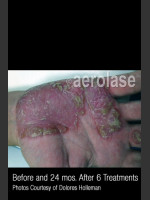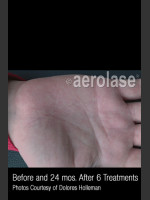Tips For Treating Rosacea
By Carolynn Grimes
If you’re one of the millions of people affected by a skin condition called rosacea, laser treatments may be the answer you’ve been looking for. Rosacea is an inflammatory skin condition that affects about 1 in every 20 people. If left untreated, it usually becomes worse over time. Over time, people who have rosacea may end up with a permanent redness in the center of their face.
See a Board-Certified Dermatologist
There are different types of rosacea, and the first thing your dermatologist will do is evaluate your condition. There are four categories of rosacea.
- Erythematotelangiectatic rosacea: Redness, flushing, visible blood vessels.
- Papulopustular rosacea: Redness, swelling, and acne-like breakouts.
- Phymatous rosacea: Skin thickens and has a bumpy texture.
- Ocular rosacea: Eyes red and irritated, eyelids can be swollen, and a person may have what looks like a sty.
Dr. Gerald Goldberg, a board-certified dermatologist in Tucson, Arizona says, “I want to attend to any papules and pustules, much like an adult form of acne. We want to get that under control, and we normally use medications, oral and/or topical.”
Reduce Redness with Vascular Lasers
Once the acne is taken care of, Goldberg says many rosacea patients want to address their aesthetic concerns. “particularly blush like rosacea, which is a diffuse redness of the face, or branch-like vessels. Whether it’s around the nose or cheeks, those are ideal patients we treat with vascular lasers.” Goldberg’s expertise in laser surgery has earned him the distinction of being one of the most recognized laser surgeons in the world.
According to the American Academy of Dermatology, when lasers are used to treat visible blood vessels, most patients see a 50% to 75% reduction in visible blood vessels after 1 to 3 treatments. Some people see a 100% reduction.
Rosacea Triggers
Many patients will need additional treatments in the next 3-5 years for new vessels that have developed. While there is no permanent cure for rosacea, there are certain triggers and lifestyle habits that may make it worse. These include:
- Extreme temperatures
- Sunlight
- Aggressively scrubbing your face
- Alcohol in facial products Some medications
While there’s no cure for rosacea, your dermatologist can help ease your symptoms or control it through medication, lasers, and simple lifestyle changes.


